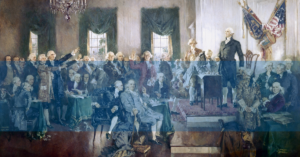Justice Denied: The Eugenics Crusade
Today we continue our exploration of Teaching American History’s two-volume document collection, Documents and Debates in American History and Government.
In 1994, CBS broadcast the film Against Her Will, the story of Carrie Buck, a young Virginia mother forced to undergo involuntary sterilization in 1927. In the opening scene, Virginia Governor Elbert Lee Trinkle makes a fundraising appeal to his supporters. Trinkle speaks of social science perfecting society, economic science perfecting economics, and “the possibility that science can even perfect the human race.” The scriptwriters may have taken liberties with Trinkle’s actual words. However, the speech captures the philosophy of eugenics, an early 20th-century movement whose followers believed that the compulsory sterilization of ‘mentally defective” men and women would eventually eliminate the genes they believed caused low intelligence or anti-social behavior.
Carrie Buck’s life was tragic in many ways. A poorly educated Virginia girl whose mother was rumored to be a mentally disabled prostitute, she had an out-of-wedlock child in 1924. The child was taken from her by child services, and she was forced to work as domestic help while the state sought to sterilize her.
That same year, Virginia passed a Sterilization Act designed to eliminate “idiocy, imbecility, feeble-mindedness, and epilepsy” by requiring the compulsory sterilization of those suffering from such “defects.” Authorities at the Virginia State Colony for Epileptics and the Feeble-minded arranged for lawyers friendly to the new legislation to sue the colony, seeking an injunction against Carrie’s sterilization, in hopes the case would eventually reach the Supreme Court. They hoped the Supreme Court would rule the law constitutional, thus paving the way for widespread compulsory sterilization of men and women deemed defective by the state.
In Virginia state court, Carrie’s attorneys offered no challenge to the state’s assessment of her mental condition, nor did they call any witnesses in her defense. They did not defend her against charges of promiscuity by establishing that Carrie became pregnant as the result of rape. They even failed to challenge a colony witness assertion that Carrie’s seven-month-old child, Vivian, did not “look normal.”
As expected, Carrie lost at the state level. The case eventually advanced to the Supreme Court, where the court upheld the Virginia Statute. Associate Justice Oliver Wendell Holmes wrote the 8-1 majority opinion in Buck v. Bell (Document E), including the now infamous remark: “Three generations of imbeciles is enough.”
One surprising fact about the Progressive Era is that many prominent progressives supported the eugenics movement, including Theodore Roosevelt, Margaret Sanger, and W.E.B.DuBois. Developed and promoted by Francis Galton, Harry Laughlin, and others, eugenics involved “the study of how to arrange reproduction within a human population to increase the occurrence of heritable characteristics regarded as desirable.” The Supreme Court’s 1927 decision in Buck v Bell opened the floodgates for state control over disabled citizens’ reproductive choices. Eugenics proponents seized upon compulsory sterilization of mentally disabled individuals. Over thirty states adopted sterilization programs (North Carolina’s lasted until 1977), and over 70,000 Americans were forced to undergo sterilization procedures. Eugenics did not begin to lose its support until after WWII and the Nuremberg War Crimes Trial, where Nazi defendants cited the compulsory sterilization laws of America in their defense.
Historian Paul Lombardo’s research (Three Generations, No Imbeciles: Eugenics, the Supreme Court and Buck v. Bell) raises questions about Carrie Buck’s case beyond the injustice of undergoing sterilization against her will. Lombardo uncovered letters Carrie wrote to Dr. John Bell and his nurse. Her correspondence indicates that Carrie was a reasonably literate person, capable of communicating her wishes. Carrie’s alleged “not normal” daughter Vivian, earned honor roll status in elementary school.
Our Documents and Debates collection presents the story of the Eugenics crusade in Chapter 19: The Progressive Era: Eugenics. The sources document the contention of eugenics’ proponents that “the kingdom of some kind of superman” was at hand. They also illustrate that eugenics faced strong opposition. Pennsylvania Governor Samuel Pennypacker vetoed “An Act for the prevention of idiocy,” with sarcasm. “If idiocy could be prevented by an act of assembly,” Pennypacker wrote, ” we may be quite sure that such an act would have long been passed and approved by the state.”
Documents in this chapter include:
- Governor Samuel W. Pennypacker, Veto of Eugenics Law, March 30, 1905
- G. Stanley Hall, “Eugenics as a New Creed,” 1911
- New York Times, “Pastors for Eugenics,” June 6, 1913
- Supreme Court of Indiana, Judgment, November Term, 1920
- Associate Justice Oliver Wendell Holmes, Buck v. Bell, May 2, 1927
- “Better Baby Contest,” Indiana State Fair, 1931
We have also provided audio recordings of the chapter’s Introduction, Documents, and Study Questions. These recordings support literacy development for struggling readers and the comprehension of challenging text for all students.
We the Teachers blog, features Documents and Debates with their accompanying audio recordings each month until recordings of all 29 chapters are complete. In today’s post, we feature Volume II, Chapter 19: The Progressive Era: Eugenics. On October 6, we will highlight Chapter 5: Between Resistance and Rebellion from Volume 1 of Documents and Debates in American History.



